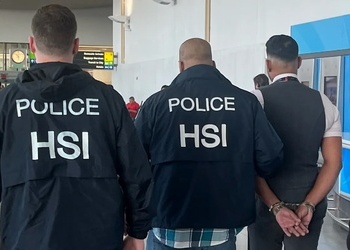A case in which flight attendants working for passenger airlines used their privileged access to transport millions of dollars of fentanyl profits from the United States to the Dominican Republic highlights how money laundering networks continue to use old school, analog tactics.
Four flight attendants who were working commercial air routes between New York and the Dominican Republic — Charlie Hernandez, Sarah Valerio Pujols, Emmanuel Torres, and Jarol Fabio — were arrested on May 7. All four were regularly carrying cash in their bags, according to United States government investigators.
SEE ALSO: How Latin America’s Synthetic Drug Traffickers Launder Dirty Cash
The investigation began after Homeland Security Investigators (HSI) officials got a tip from other co-conspirators involved in the smuggling scheme. They set up a sting in which the flight attendants were given cash that they were told was drug money to hand off to other members of the money laundering organization in the Dominican Republic.
They all had “known crew member” status with the Transportation Security Administration, which allowed them to pass through a special security lane at John F. Kennedy International Airport and other US airports, according to the allegations.
The scheme had been running since at least 2021, and worked smoothly because the defendants were “abusing their privileges as airline employees,” said US Attorney Damian Williams.
It is not clear how much the defendants made, but authorities say they helped launder at least $8 million.
InSight Crime Analysis
In today’s world, in which there is increasing scrutiny on digital means to launder money, this case is a reminder that things like bulk-cash smuggling remain a staple in the underworld.
The flight attendants detailed in the case above had been smuggling cash in their bags for the best part of three years before they were discovered.
And while bulk cash smuggling is a common and unsophisticated way of laundering drug proceeds, it is still effective. The recent New York case follows other similar past examples of cash smuggling by flight attendants operating out of Boston and Philadelphia. One woman even tried to get a bag filled with cocaine past security onto a flight she was working on leaving Los Angeles International Airport.
SEE ALSO: Corruption, Crypto Test LatAm Money Laundering Laws
Of course, this does not preclude criminal organizations from combining cash smuggling with other methods to move value accrued from their drug sales around the world. The use of China-based underground banking systems, for instance, is becoming the preferred method of Mexico’s cartels, according to the Drug Enforcement Administration (DEA). Trade-based money laundering schemes (when value is moved across borders in the form of goods), the construction of resorts, and timeshares, and cryptocurrency are some of the other methods that drug traffickers use to conceal the earnings from their criminal activities.
Cases against these networks are rare, despite the “follow-the-money” mantra often cited by the United States government as a means of bringing the world’s powerful criminal organizations to heel.
In a recent InSight Crime report on the challenges of dismantling the networks to conceal the finances of organized crime and specifically the synthetic drug industry, we reported that in 2022, the US Sentencing Commission said 1,001 individuals were prosecuted for money laundering in the US federal courts. Yet just 17% of them were charged for laundering proceeds earned from “controlled substances, violence, weapons, national security, or the sexual exploitation of a minor.”
Featured image: US Homeland Security agents escort a flight attendant accused of smuggling money out of the US and into the Dominican Republic from JFK airport. Credit: Fox News

